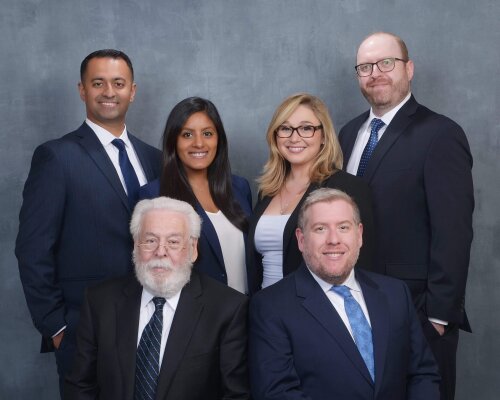Best Antitrust Litigation Lawyers in Philadelphia
Share your needs with us, get contacted by law firms.
Free. Takes 2 min.
List of the best lawyers in Philadelphia, United States
About Antitrust Litigation Law in Philadelphia, United States
Antitrust litigation covers legal disputes about competition - including price-fixing, bid-rigging, monopolization, illegal mergers, and other conduct that harms competition or consumers. In Philadelphia, antitrust matters are typically litigated in federal court when federal statutes like the Sherman Act, the Clayton Act, and the Federal Trade Commission Act are at issue. The U.S. District Court for the Eastern District of Pennsylvania handles most federal antitrust lawsuits in the region. State law claims or supplemental claims may proceed in Pennsylvania state courts, including the Court of Common Pleas of Philadelphia County.
Antitrust enforcement in the United States is both public and private. Federal agencies such as the U.S. Department of Justice Antitrust Division and the Federal Trade Commission pursue investigations and enforcement actions. State attorneys general, and occasionally city or county governments, also bring cases. Private parties - businesses, consumers, or competitor groups - can bring civil suits seeking injunctive relief, monetary damages, and recovery of attorneys fees in many circumstances.
Why You May Need a Lawyer
Antitrust litigation is complex, fact-intensive, and often expensive. You should consider hiring a lawyer if any of the following apply:
- You are a business under investigation by the U.S. Department of Justice, the Federal Trade Commission, or a state attorney general for alleged collusion, price-fixing, or market allocation.
- You received a subpoena, civil investigative demand, grand jury subpoena, or criminal referral related to market conduct.
- Your company is planning or completing a merger or acquisition that may trigger Hart-Scott-Rodino premerger notification requirements or raise antitrust concerns.
- You suspect competitors are engaging in anti-competitive practices that are harming your business - for example, coordinated price increases, exclusive-dealing contracts, refusal to deal, or tying arrangements.
- You are a consumer or business who believes you were harmed by anti-competitive conduct and are considering a private lawsuit, including a class action.
- You need help navigating complex litigation steps - class certification, expert economic analysis, discovery disputes, and settlement negotiations.
Local Laws Overview
Key legal frameworks and institutions relevant to antitrust work in Philadelphia include:
- Federal Antitrust Statutes - The Sherman Act prohibits agreements that restrain trade and conduct that unlawfully monopolizes a market. The Clayton Act addresses mergers and certain discriminatory practices, and provides for treble damages in many private actions. The Federal Trade Commission Act prohibits unfair methods of competition.
- Federal Enforcement Agencies - The U.S. Department of Justice Antitrust Division handles criminal prosecutions and civil enforcement of federal antitrust laws. The Federal Trade Commission brings civil enforcement actions and reviews mergers for anticompetitive effects.
- Hart-Scott-Rodino Premerger Notification - Businesses that meet size thresholds must file premerger notifications with the federal agencies and wait the required waiting period before closing certain transactions.
- State Enforcement - The Pennsylvania Attorney General can investigate and prosecute anticompetitive conduct under state law. State consumer protection and unfair competition laws can be used together with or instead of federal claims in some cases.
- Local Courts - Antitrust actions with federal claims usually proceed in the U.S. District Court for the Eastern District of Pennsylvania, which sits in Philadelphia. State law claims and some injunctive matters may go to the Court of Common Pleas of Philadelphia County.
- Procedural Considerations - Antitrust cases often involve large-scale discovery, complex economic expert testimony, class action motions under Federal Rule of Civil Procedure 23, and the possibility of criminal indictments for hardcore cartel behavior. Remedies may include injunctions, treble damages for prevailing private plaintiffs under federal law, disgorgement, divestitures, and corporate or individual fines and imprisonment for criminal violations.
Frequently Asked Questions
What counts as antitrust or anti-competitive conduct?
Anti-competitive conduct includes cartel behavior like price-fixing, bid-rigging, and market allocation; abuses of monopoly power; certain exclusive-dealing or tying arrangements; and mergers or acquisitions that substantially lessen competition. Determining whether conduct violates the law requires analyzing the market, the parties involved, and the practical competitive effects.
Who enforces antitrust laws in Philadelphia?
Enforcement can come from federal agencies - principally the U.S. Department of Justice Antitrust Division and the Federal Trade Commission - as well as from the Pennsylvania Attorney General. Private parties also bring civil actions in federal and state courts. The U.S. District Court for the Eastern District of Pennsylvania hears federal antitrust cases in the Philadelphia area.
What should I do if my company receives a subpoena or government inquiry?
Immediately preserve relevant documents and electronically stored information and contact experienced antitrust counsel before responding. Do not destroy or alter evidence. Counsel can advise about privilege issues, whether to negotiate scope or timing, and how to respond without waiving rights or creating exposure.
Can individuals or small businesses bring antitrust lawsuits?
Yes. Consumers, small businesses, and competitors can bring private antitrust claims seeking injunctive relief and damages. Many antitrust actions are class actions where a group of plaintiffs sue on behalf of similarly situated people. The viability of a claim depends on factors like standing, proof of harm, and whether other plaintiffs or public enforcers are pursuing remedies.
What remedies are available in antitrust cases?
Remedies may include injunctive relief to stop anti-competitive conduct, monetary damages to compensate harmed parties, trebled damages in many federal private actions, disgorgement or restitution, divestiture or restructuring in merger cases, and criminal fines or imprisonment for individuals engaged in criminal cartel activity.
How long do antitrust cases typically take?
Antitrust litigation can take years. Complex discovery, expert economic analysis, class certification briefing, and appeals extend timelines. Government investigations can also be lengthy. Many cases settle before trial, but preparing for trial-grade discovery and expert work is common early in the process.
What is the statute of limitations for antitrust claims?
Under federal law, private antitrust claims are generally subject to a four-year statute of limitations that often begins when the plaintiff knew or should have known of the injury. Tolling rules and doctrines like fraudulent concealment can extend deadlines. State statutes of limitations and tolling rules vary, so consult counsel promptly if you suspect anticompetitive conduct.
Do mergers require any special filings?
Many mergers and acquisitions meeting size thresholds must comply with the Hart-Scott-Rodino premerger notification rules and file with federal antitrust agencies. Parties must wait through the agencies' initial review periods before closing. Antitrust counsel should be involved early to evaluate filing requirements and potential structural or behavioral remedies.
How are damages calculated in antitrust cases?
Damages often require complex economic analysis to measure overcharges, lost profits, or market-wide harm. Plaintiffs usually rely on economic experts to model the competitive marketplace and quantify harm. The defendant can present alternate models. Courts require reliable methodologies that fit the facts of the case.
How do I choose an antitrust lawyer in Philadelphia?
Look for lawyers or firms with specific antitrust experience, trial experience, and knowledge of federal and state enforcement practices. Ask about relevant case history, experience with the Eastern District of Pennsylvania, relationships with economic experts, experience handling government investigations and HSR filings, and fee structures. Early consultations can help assess fit and strategy.
Additional Resources
Below are organizations and government bodies that can provide information or enforcement assistance. These are suggested starting points for more information or to identify the relevant enforcement authority:
- U.S. Department of Justice Antitrust Division - primary federal criminal and civil enforcer of the Sherman Act.
- Federal Trade Commission - civil antitrust enforcement agency and merger reviewer.
- Pennsylvania Office of Attorney General - enforces state consumer protection and antitrust-related matters.
- U.S. District Court for the Eastern District of Pennsylvania - the federal court forum where many antitrust cases in the Philadelphia region are heard.
- Philadelphia Court of Common Pleas - state court forum for related state law claims.
- American Bar Association Antitrust Law Section - resource for lawyers and the public about antitrust practice.
- Philadelphia Bar Association - local bar with committees and referral services that may help find experienced antitrust counsel.
- Local law school clinics or university legal research centers - may offer background materials or educational programs related to competition law.
Next Steps
If you believe you have an antitrust issue or you are contacted by an enforcement agency, take these steps:
- Preserve evidence - Immediately implement a litigation hold for documents, emails, and electronic data that might be relevant.
- Consult counsel - Contact an antitrust attorney promptly for a confidential assessment. If you are a business with existing counsel, notify them right away.
- Gather basic information - Prepare a timeline, list of key agreements and contracts, copies of communications relevant to the matter, and any documents received from regulators or other parties.
- Evaluate risk and strategy - Work with counsel to assess exposure, potential defenses, need for expert economists, and settlement versus litigation options.
- If facing a merger, assess HSR filing obligations and timing - involve counsel early to meet filing deadlines and prepare required submissions.
- Consider alternative dispute resolution - Mediation or arbitration can be viable routes to resolve disputes more quickly and cost-effectively than full litigation.
Antitrust matters require prompt, specialized attention. Early legal advice can preserve options, minimize risk, and shape a strategy suited to the facts of your case and the procedural landscape in Philadelphia and federal courts.
Lawzana helps you find the best lawyers and law firms in Philadelphia through a curated and pre-screened list of qualified legal professionals. Our platform offers rankings and detailed profiles of attorneys and law firms, allowing you to compare based on practice areas, including Antitrust Litigation, experience, and client feedback.
Each profile includes a description of the firm's areas of practice, client reviews, team members and partners, year of establishment, spoken languages, office locations, contact information, social media presence, and any published articles or resources. Most firms on our platform speak English and are experienced in both local and international legal matters.
Get a quote from top-rated law firms in Philadelphia, United States — quickly, securely, and without unnecessary hassle.
Disclaimer:
The information provided on this page is for general informational purposes only and does not constitute legal advice. While we strive to ensure the accuracy and relevance of the content, legal information may change over time, and interpretations of the law can vary. You should always consult with a qualified legal professional for advice specific to your situation.
We disclaim all liability for actions taken or not taken based on the content of this page. If you believe any information is incorrect or outdated, please contact us, and we will review and update it where appropriate.










